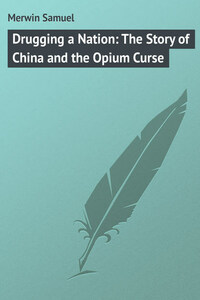In September, 1906, an edict was issued from the Imperial Court at Peking which states China’s predicament with naïveté and vigour.
“The cultivation of the poppy,” runs the edict, in the authorized translation, “is the greatest iniquity in agriculture, and the provinces of Szechuen, Shensi, Kansu, Yunnan, Kweichow, Shansi, and Kanghuai abound in its product, which, in fact, is found everywhere. Now that it is decided to abandon opium smoking within ten years, the limiting of this cultivation should be taken as a fundamental step … opium has been in use so long by the people that nearly three-tenths or four-tenths of them are smokers.”
“Three-tenths or four-tenths” of the Chinese people, – one hundred and fifty million opium-smokers – mean three or four times the population of Great Britain, a good many more than the population of the United States!
The Chinese are notoriously inexact in statistical matters. The officials who drew up the edict probably wished to convey the impression that the situation is really grave, and employed this form of statement in order to give force to the document. No accurate estimate of the number of opium victims in China is obtainable; but it is possible to combine the impressions which have been set down by reliable observers in different parts of the “Middle Kingdom,” and thus to arrive at a fair, general impression of the truth. The following, for example, from Mr. Alexander Hosie, the commercial attaché to the British legation at Peking, should carry weight. He is reporting on conditions in Szechuen Province:
“I am well within the mark when I say that in the cities fifty per cent. of the males and twenty per cent. of the females smoke opium, and that in the country the percentage is not less than twenty-five for men and five per cent. for women.” There are about forty-two million people in Szechuen Province; and they not only raise and consume a very great quantity of opium, they also send about twenty thousand tons down the Yangtse River every year for use in other provinces. The report of other travellers, merchants, and official investigators indicate that about all of the richest soil in Szechuen is given over to poppy cultivation, and that the labouring classes show a noticeable decline of late in physique and capacity for work.
In regard to another so-called “opium province,” Yunnan, we have the following statement: “I saw practically the whole population given over to its abuse. The ravages it is making in men, women, and children are deplorable… I was quite able to realize that any one who had seen the wild abuse of opium in Yunnan would have a wild abhorrence of it.”
In later chapters we shall go into the matter more at length. Here let me add to these statements merely a few typical scraps of information, selected from a bundle of note-books full of records of chats and interviews with travellers of almost every nationality and of almost every station in life. The secretary of a life insurance company which does a considerable business up and down the coast told me that, roughly, fifty per cent of the Chinese who apply for insurance are opium-smokers. Another bit comes from a man who lived for several years in an inland city of a quarter of a million inhabitants. The local Anti-opium League had 750 members, he said and he believed that about every other man in the city was a smoker. “It is practically a case of everybody smoking,” he concluded.
Twenty-five years ago, when the consumption of opium in China could hardly have been more than half what it is to-day, a British consul estimated the proportion of smokers in the region he had visited as follows: “Labourers and small farmers, ten per cent.; small shopkeepers, twenty per cent.; soldiers, thirty per cent.; merchants, eighty per cent.; officials and their staff, ninety per cent.; actors, prostitutes, vagrants, thieves, ninety-five per cent.” The labourers and farmers, the real strength of China, as of every other land, had not yet been overwhelmed – but they were going under, even then. The most startling news to-day is from these lower classes, even from the country villages, the last to give way. Dr. Parker, the American Methodist missionary at Shanghai, informed me that reports to this effect were coming in steadily from up country; and during my own journey I heard the same bad news almost everywhere along a route which measured, before I left China, something more than four thousand miles.










